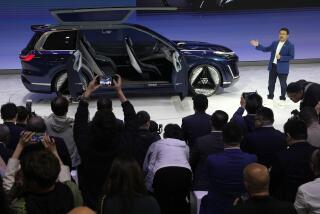EU Reforms Could Put a Big Dent in Auto Makers’ Profits
- Share via
BERLIN — The cherished personal car is the most expensive and important purchase made by most Europeans, who are far less likely than Americans to become homeowners. Yet it is the one product that has proved fiercely resistant to the consumer benefits promised by Europe’s emerging single market.
Car prices in the auto-making mecca that is Germany, as in some other European Union nations, are dictated by the manufacturers. They maintain cradle-to-grave control over their products by obliging dealers whom they supply with new cars to service only those customers who bought from their showrooms.
That prevents a consumer from taking advantage of lower prices in other countries because they cannot get parts or repairs from the brand’s representatives in their home regions.
But a long-awaited EU review of auto makers’ exclusive networks for sales and service has criticized the current practice as price-inflating and anti-competitive, and it has put manufacturers on notice that their vertical monopolies will end in 2002.
The EU report, which asks producers and sellers to propose a new system by early next year, contends that the current practices can add as much as 65% to the cost and maintenance of an automobile over its lifetime.
The Continent’s auto makers have long enjoyed exemption from EU rules against cartels and have vowed to fight the new moves. They argue that holding car sales and services to the same competition yardstick applied to dairy products or clothing will result in poorer after-sales services to the consumer and a likely loss of already dwindling car-manufacturing jobs. They maintain that automobiles are unique in needing regular care that only their makers can properly provide.
At present, manufacturers such as Volkswagen and DaimlerChrysler sell their products through dealerships that are either owned by the producers or under binding contract to sell the cars at specified prices in regions over which the salespeople have a monopoly. Service, such as warranty repairs and tuneups, is available only at manufacturer-designated garages at fixed prices.
“EU competition rules clearly prohibit the operation of networks for the purpose of dictating prices--this is unquestionably against the consumers’ interest,” complained Dirk Klasen, an economic analyst with the Bonn-based Assn. of Consumer Organizations, which is representing the buyers’ interests in the ongoing debate.
The exclusive sales and service contracts have stifled the development of independent car dealerships in Europe. Manufacturers won’t sell their products to the upstarts, and consumers who buy from independents have difficulty getting their cars serviced.
Because dealers are dependent on the manufacturer for their stock and for a lock on the local sales market, they tend to side with the auto makers in arguing for continuation of the status quo.
“There’s a big difference between buying a refrigerator and buying a car,” said Helmut Becker, head of one of Germany’s most successful dealership networks, who contends that consumers benefit from the relationship established at the time of purchase and carried on for the lifetime of the car.
If the EU wants to open sales to competition, he said, it will have to establish uniform tax structures among its 15 countries, whose sales tax and registration fees differ so much that the cost of buying a car can vary by more than 20% from one country to another.
Even the EU report, compiled at the request of competition czar Mario Monti, concedes that the alliance has failed to create a genuine single market--a logical precondition to enhancing price competition for the Continent’s most lucrative products.
“Dealers would of course like to see the same purchasing price [from manufacturers] in effect throughout Europe, but with the different tax structures, this would create chaos in the domestic markets,” Becker said. “When the ground rules are the same for everyone, you’ll see a different kind of competition emerge. But for now, the status quo is the best scenario for the consumer.”







